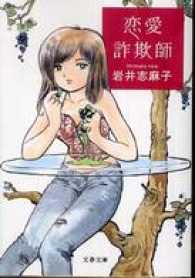Full Description
A new series of bespoke, full-coverage resources developed for the 2015 A Level English qualifications. Endorsed for the AQA A/AS Level English Language and Literature specification for first teaching from 2015, this print Student Book offers stretch opportunities for the more able and additional scaffolding for those who need it. Providing full coverage of the specification, the unique three-part structure bridges the gap between GCSE and A Level and develops students' understanding of descriptive linguistics and literary and non-literary stylistics, together with support for the revised coursework component and new textual intervention task. An enhanced digital edition and free Teacher's Resource are also available.
Contents
Introduction; BEGINNING: 1. What does the study of language and literature mean at A Level? 2. Text producers and receivers; 3. Mode and genre; 4. Variation, register and representation; 5. Narrative; 6. Language level 1: Lexis and semantics; 7. Language level 2: Grammar; 8. Language level 3: Phonetics, phonology and prosodics; 9. Language level 4: Graphology; 10. Language level 5: Pragmatics; 11. Language level 6: Discourse; 12. Analysing texts; 13. Literature and literariness; 14. Becoming an investigator; DEVELOPING: Introduction to Telling stories; 15. Remembered places; 15.1 Introduction to the anthology; 15.2 Why Paris?; 15.3 Remembering places; 15.4 Re-creative writing and Remembered places; 15.5 Places, people and events; 15.6 Metaphor; 15.7 Genre; 15.8 Bringing it all together: AS Level; 15.9 Bringing it all together: A Level; 16. Imagined worlds; 16.1 The fantasy genre; 16.2 Setting up fictional worlds; 16.3 Characterisation; 16.4 Point of view; 16.5 Interpretations of fantasy; 16.6 Bringing it all together: AS Level; 16.7 Bringing it all together: A Level; 17. Poetic voices; 17.1 Introduction; 17.2 The set texts and approaching the poetry anthology; 17.3 Analysing poetry from a language perspective; 17.4 Voice; 17.5 Voice in poetry through time; 17.6 Language and poetic voice; 17.7 Bringing it all together: AS Level; 17.8 Bringing it all together: A Level; Introduction to Exploring conflict; 18. Writing about society; 18.1 Literature, society and re-creative writing; 18.2 Re-creative writing, from the exploratory and experimental to the targeted and strategic; 18.3 Commentary: analytical explanations of re-creative writing; 18.4 Bringing it all together; 19. Dramatic encounters; 19.1 Exploring conflict; 19.2 Representing turn-taking; 19.3 Representing speech and meaning; 19.4 Exploring dramatic conventions; 19.5 Psychological and social drama: Williams, Miller and Kinnear; 19.6 Creating characters; 19.7 Power and positioning; 19.8 The importance of politeness; 19.9 Exploring themes; 19.10 Bringing it all together; 20. Making connections; 20.1 What is Making connections?; 20.2 Choosing connections; 20.3 Thinking about texts; 20.4 Thinking about non-literary connections; 20.5 Thinking about topics; 20.6 Choosing methodologies; 20.7 Data collection methods; 20.8 Ethical considerations; 20.9 Working with spoken data; 20.10 How much literary and non-literary material?; 20.11 Devising research questions; 20.12 Selecting language levels; 20.13 Analysis: structuring connections; 20.14 Reading and writing critically; 20.15 Academic conventions: References; 20.16 Exploring connections; 20.17 Keeping context in mind; 20.18 Bringing it all together; ENRICHING: 21. Remembered places; 22. Imagined worlds; 23. Poetic voices; 24. Writing about society; 25. Dramatic encounters; 26. Making connections; References; Index; Acknowledgements
-

- 洋書電子書籍
- Catalina : A Novel
-

- 電子書籍
- 恋愛詐欺師 文春文庫




